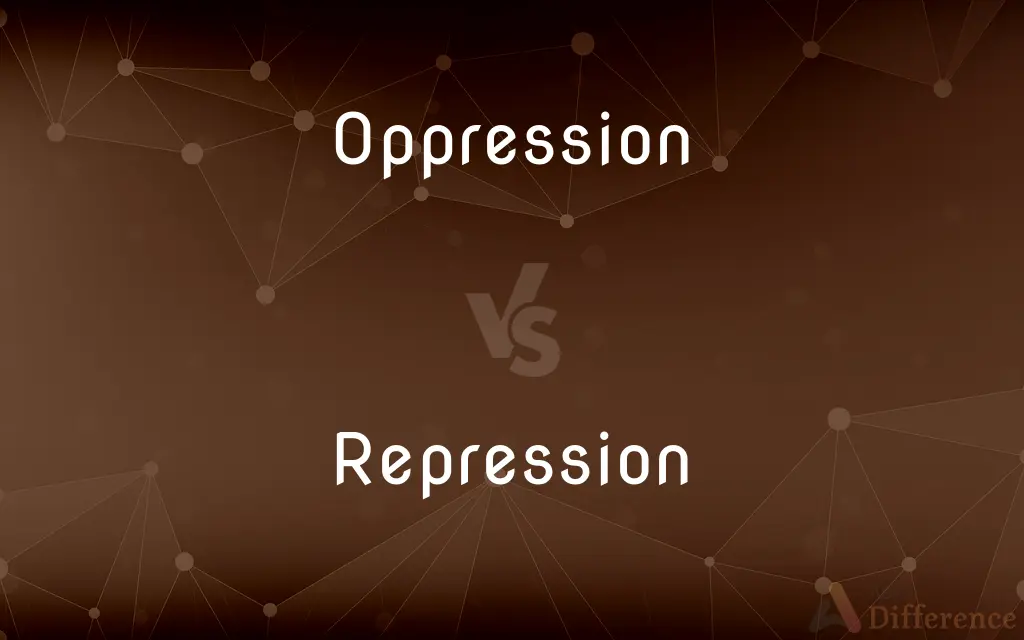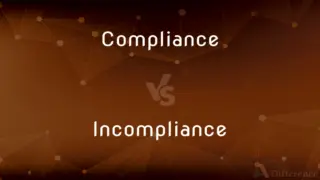Oppression vs. Repression — What's the Difference?
Edited by Tayyaba Rehman — By Fiza Rafique — Updated on September 21, 2023
Oppression refers to the unjust or cruel exercise of power over a group or individual. Repression is more about controlling or suppressing emotions, desires, or actions, often through societal norms or force.

Difference Between Oppression and Repression
Table of Contents
ADVERTISEMENT
Key Differences
Oppression and repression are two terms that are often confused but serve to describe different phenomena. Oppression involves the systemic, often institutionalized, mistreatment or exploitation of a group or individual. It typically entails policies or actions that limit freedoms and create inequalities. Repression, on the other hand, focuses more on the act of suppressing or controlling emotions, thoughts, or actions, either individually or on a societal level.
When discussing issues of social justice or human rights, the word oppression is more commonly used. For example, one might speak of the oppression of minority groups in a particular country. Repression, however, tends to appear in psychological or sociological contexts, like the repression of emotions or the repression of political dissidents by a regime.
Grammatically, both words function as nouns and can be used in similar sentence structures. Oppression often comes into play with words like "systemic," "institutional," or "social," underscoring its more societal focus. Repression is often paired with words like "emotional," "psychological," or "political," pointing to its more internal or controlling nature.
In summary, oppression deals primarily with social and systemic injustices and inequalities, whereas repression is generally about suppressing thoughts, feelings, or actions. The two can overlap, such as when a repressive regime also oppresses its citizens, but their core meanings are distinct.
Comparison Chart
Focus
Social/Systemic
Emotional/Controlling
ADVERTISEMENT
Common Context
Social Justice
Psychology
Grammatical Usage
Noun
Noun
Associated Words
Institutional, Social
Emotional, Political
Conceptual Role
External
Internal
Compare with Definitions
Oppression
Oppression is often supported by laws or norms.
Systemic oppression can be hard to dismantle.
Repression
Repression can be both personal and societal.
Cultural repression stifles creativity.
Oppression
Oppression is the systematic mistreatment or exploitation of a group.
The oppression of the minority was evident in the new policies.
Repression
Repression is the act of suppressing emotions or thoughts.
Repression of feelings can lead to mental health issues.
Oppression
Oppression involves unjust use of power or authority.
The government's oppression was felt in every sector.
Repression
Repression can be a psychological mechanism.
Repression in psychology refers to pushing painful memories out of awareness.
Oppression
Oppression can be institutional and widespread.
Oppression in the workplace led to protests.
Repression
Repression can be enacted by authority figures.
The government engaged in the repression of free speech.
Oppression
Oppression is malicious or unjust treatment or exercise of power, often under the guise of governmental authority or cultural opprobrium. Oppression may be overt or covert, depending on how it is practiced.
Repression
Repression involves limiting or controlling actions.
The regime was known for its political repression.
Oppression
The action of oppressing; arbitrary and cruel exercise of power
A system of oppression.
Repression
The act of repressing or the state of being repressed.
Oppression
The state of being oppressed
Caught in the oppression of poverty.
Repression
(Psychology) The unconscious exclusion of painful impulses, desires, or fears from the conscious mind.
Oppression
A feeling of being weighed down in mind or body
"Every time I entered my house, an oppression settled on me so heavy that I had to stand for minutes at a time in the doorway, gathering what strength I could find" (Erin McGraw). "One has ... to come under the shadow of war to feel fully its oppression" (J.R.R. Tolkien).
Repression
The act of repressing; state of being repressed.
History shows that when governments fear the truth and increase repression, their days are limited.
Oppression
The exercise of authority or power in a burdensome, cruel, or unjust manner.
Repression
The involuntary rejection from consciousness of painful or disagreeable ideas, memories, feelings, or impulses.
Oppression
The act of oppressing, or the state of being oppressed.
Extreme freedom is followed by extreme oppression, said Plato.
Repression
The act of repressing, or state of being repressed; as, the repression of evil and evil doers.
Oppression
A feeling of being oppressed.
Our oppression was lifted by the reappearance of the sun.
Repression
That which represses; check; restraint.
Oppression
The act of oppressing, or state of being oppressed.
Repression
A state of forcible subjugation;
The long repression of Christian sects
Oppression
That which oppresses; a hardship or injustice; cruelty; severity; tyranny.
Repression
(psychiatry) the classical defense mechanism that protects you from impulses or ideas that would cause anxiety by preventing them from becoming conscious
Oppression
A sense of heaviness or obstruction in the body or mind; depression; dullness; lassitude; as, an oppression of spirits; an oppression of the lungs.
There gentle SleepFirst found me, and with soft oppression seizedMy drowsed sense.
Repression
The act of repressing; control by holding down;
His goal was the repression of insolence
Oppression
Ravishment; rape.
Oppression
The act of subjugating by cruelty;
The tyrant's oppression of the people
Oppression
The state of being kept down by unjust use of force or authority:
After years of oppression they finally revolted
Oppression
A feeling of being oppressed
Oppression
Oppression aims to subjugate and marginalize.
Gender-based oppression is still rampant.
Common Curiosities
Can repression occur in individuals?
Yes, repression can be a psychological process in individuals.
What does oppression mean?
Oppression refers to the unjust or cruel exercise of power over a group or individual.
What does repression mean?
Repression involves controlling or suppressing emotions, desires, or actions.
Are the words interchangeable?
No, they refer to different concepts and are generally not interchangeable.
Is oppression only a societal issue?
Most commonly, yes, but it can also occur in smaller settings like families or workplaces.
Can repression be governmental?
Yes, political repression involves suppressing political freedom.
How is repression used in a sentence?
"She dealt with her grief through repression."
Does oppression always involve law?
Not always, but laws can reinforce or perpetuate oppression.
Is oppression always systemic?
Not necessarily, but it often involves systems or institutions.
How is oppression used in a sentence?
"The oppression of minority groups is a serious issue."
Can oppression be psychological?
While generally systemic, the effects of oppression can certainly be psychological.
Can repression be social?
Yes, societal norms can lead to the repression of certain behaviors or identities.
Can one be both oppressed and repressed?
Yes, especially in authoritarian regimes that control both societal structures and individual behaviors.
Is repression always bad?
Not necessarily; some level of emotional repression can be normal or protective.
What's the opposite of oppression?
Liberation or equality could be considered opposites of oppression.
Share Your Discovery

Previous Comparison
Coinkydink vs. Coinkidink
Next Comparison
Compliance vs. IncomplianceAuthor Spotlight
Written by
Fiza RafiqueFiza Rafique is a skilled content writer at AskDifference.com, where she meticulously refines and enhances written pieces. Drawing from her vast editorial expertise, Fiza ensures clarity, accuracy, and precision in every article. Passionate about language, she continually seeks to elevate the quality of content for readers worldwide.
Edited by
Tayyaba RehmanTayyaba Rehman is a distinguished writer, currently serving as a primary contributor to askdifference.com. As a researcher in semantics and etymology, Tayyaba's passion for the complexity of languages and their distinctions has found a perfect home on the platform. Tayyaba delves into the intricacies of language, distinguishing between commonly confused words and phrases, thereby providing clarity for readers worldwide.















































